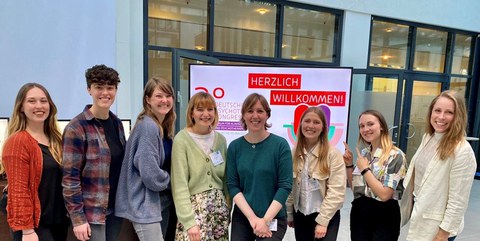May 15, 2023
The CFMH Lab at the 2nd German Psychotherapy Congress in Berlin
Our team participated in this year's 2nd German Psychotherapy Congress, which took place in Berlin from 9 to 13 May. The congress dealt with current topics in clinical psychology and psychotherapy, such as the treatment of mental illness, the situation of psychotherapy care or the optimisation of psychotherapy, and brought together scientists, experts and practitioners from different fields.
The congress began with an inspiring opening speech by the two congress presidents Prof. Dr. Eva-Lotta Brakemeier (University of Greifswald) and Prof. Dr. Jan Richter (University of Hildesheim), who emphasised the importance of the topics discussed for society. Afterwards, various contributions, discussion rounds and keynote lectures were held, which illuminated the broad topic of psychotherapy from different perspectives.
As a team, we had the opportunity to ask questions and participate in interactive workshops that introduced us to practical applications and approaches.
In addition, we presented our current research in our own papers. Jana Ray presented her current research on longitudinal prediction of childhood and adolescent disorders using partnership quality and maternal stress.
Prof. Dr. Anna-Lena Zietlow presented the first results from the NeMuk study, which investigates whether mothers with attachment problems can improve the bond with their child with the help of fMRI neurofeedback training. In addition, together with Florian Harder (University of Greifswald), she gave an insight into the study "IPT-KJU: Interpersonal Psychotherapy for Ukrainian Children, Adolescents and their Families", which is starting immediately as a cooperation project at the Greifswald and Dresden sites.
Ines Brenner and Lea Krumpholtz presented their brand new results on physiological and behavioural synchronicity between mothers and infants in an exciting symposium on neurobehavioural research.
In addition to the main lectures, another highlight was the poster presentation. These offered us a great opportunity to talk personally with the respective experts and to delve deeper into the topics. Julia Ditzer from our team presented her meta-analysis on the influence of child abuse on the ability to perceive and express emotions. Eva Bütow presented the results of her master's thesis on the relationship between partnership quality and stress experience during the COVID-19 pandemic. Furthermore, Linda Stürmlinger gave an insight into the significance of physical closeness in the phase of transition to parenthood and its relation to depressiveness and tenderness in couple and parent-child relationships. With another poster, Ines Brenner showed the importance of maternal sensitivity for the quality of interaction and the physiological stress regulation capacity in infants.
The congress celebration in Clärchens Ballhaus was a wonderful conclusion. Overall, our participation was extremely worthwhile. We were able to gain valuable insights, expand our knowledge and keep up to date with the latest developments in our field. In addition, we expanded our network and made new contacts. We are grateful for this experience and are already looking forward to future congresses to continue participating in this dynamic exchange of knowledge and ideas.

